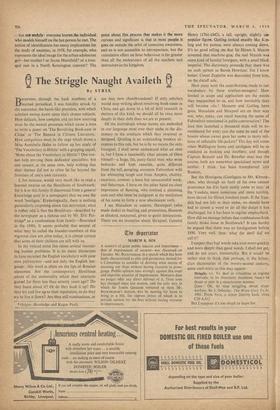The Striggle Naught Availeth
By STRIX I, for instance, would very much like to read a learned treatise oti the Houlihans of Southwark; for it is to this family (I discovered from a general knowledge quiz in a newspaper) that we owe the word `hooligan,' Etymologically, there is nothing particularly surprising about this derivation; what is rather odd is that the Houlihans—described by the newspaper as a riotous and by Mr. Eric Par- tridge* as a rumbustious Irish family—flourished in the 1890s. It seems probable that several of what may be called the founder-members of this vigorous clan are alive today; it is almost certain that some of their children are still with us.
In my twisted mind this raises several interest- ing human problems. It is no mean distinction to have enriched the English vocabulary with your own patronymic—and not only the English lan- guage: this word is often on the lips of Russian statesmen. Are the contemporary Houlihans aware of the immortality which their exertions gained for them less than seventy years ago? Do they boast about it? Or do they hush it up? Do they try and live up to their reputation, or do they try to live it down? Are they still rumbustious, or * Origins (Roittledge and Kogan Paul). are they now churchwardens? If only scholars would stop writing about revolving book-cases in China and get down to a bit of field research in matters of this kind, we should all be even more deeply in their debt than we are at present.
Of the individuals whose names are embodied in our language most owe their niche in the dic- tionary to the artefacts Which they invented or designed. Quisling is an outstanding modern ex ception to this rule, but he is by no means the only foreigner. I shall never understand what an ohm is, but I have a reasonably clear picture of Ohm himself-7a huge, fat, pasty-faced man who wore bedsocks and kept canaries, quite different from the tall, gangling, eccentric Fahrenheit with his whinnying laugh and from Ampere, chubby, r uxorious, content, a keen but unsuccessful week- end fisherman. I have on the other hand no clear impression of Banting, who evolved a slimming cure and who must be indignant at the mutilation of his name to form a now obsolescent verb.
I see Macadam as austere, Davenport (who made desks) as bustling and pretentious, Hansom as cloaked, nocturnal, given to gaslit dissipations. There are no mysteries about Shrapnel, General Henry (1761-1842), a tall, upright, slightly un popular figure. Gatling looked exactly like Kip- ling and his puttees were always coming down. It's no good telling me that Sir Hiram S. Maxim invented that machine-gun; the real Maxim was some kind of hateful foreigner, with a small black imperial. The dictionary pretends that there was no such person as Baron Howitzer, but I know better; Count Zeppelin was descended from him, on the distaff side.
How puny were the contributions made to our vocabulary by these artefact-mongers! How limited in scope and application are the words they bequeathed to us, and how inevitably they will become obs.! Hansom and Gatling have gone, Macadam and Shrapnel are on their way out; who, today, can recall hearing the name of Fahrenheit mentioned in polite conversation? The face that launched a thousand ships will be re- membered for ever; can the same be said of the bosom whose owner gave her name to many mil- lions of inflatable life-jackets? The day will come when Wellington boots and cardigans will be-as outdated as buskins and doublets; and though Captain Boycott and Dr. Bowdler may stay the course, both are somewhat specialised terms and neither, I think, has been transplanted into Russian.
But the Hooligans (Gooligans to Mr. Khrush- chev, who through no fault of his own cannot pronounce his h's) have surely come to stay,' as the Vandals, more numerous and more terrible, have stayed for fifteen hundred years. If the Van- dals had not left us their name, we should have had to invent a word to do all the duties it has discharged; for it has been in regular employment. How did we manage before that rumbustious Irish family broke loose in. Southwark? It can hardly be argued that there was no hooliganism before 1890. Very well, then; what the devil did we call it?
I suspect that. bad words take root more quickly and more deeply than good words. I shall not get, and do not court, immortality. But it would he rather nice to think that perhaps, in the better- class dictionaries of the twenty-second century,
some such entry as this may appear :
Striggle, v.t. To deal in trivialities at regUlar intervals; to be tiresomely facetious; (anus.) to drone or pipe in a monotonous manner.
[Jane : Oh, do stop striggling about class- warfare. Sir J. Osborne: ?'ire Wren Goes To It. 1981. From Strix, a minor literary hack, circa C20 A.D.] But I suppose it's too much to hope for.


































 Previous page
Previous page